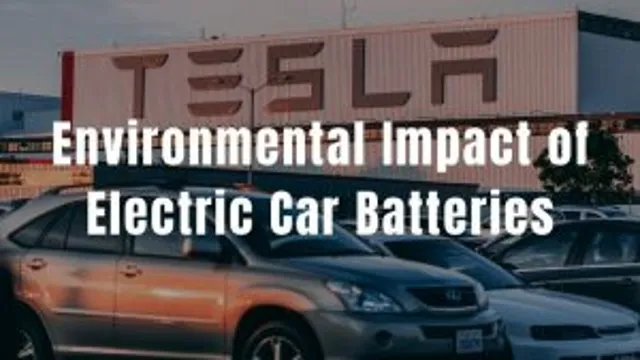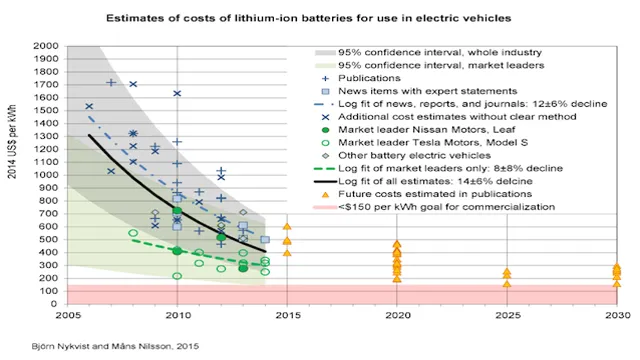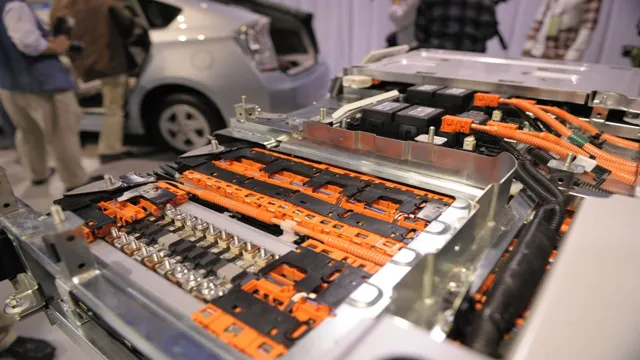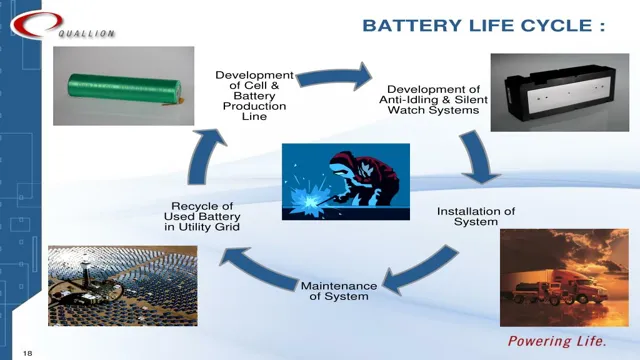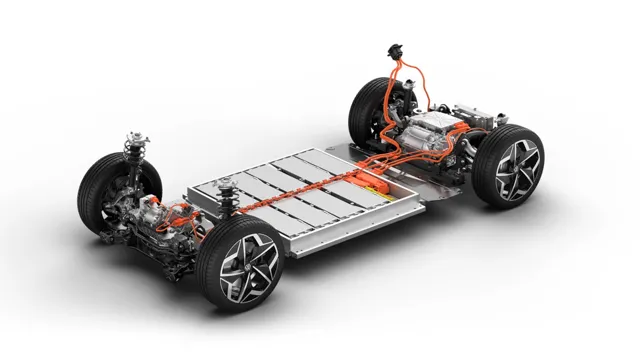Powering Towards a Greener Future: Understanding the Environmental Impact of Electric Car Batteries
Electric cars have been touted as the future of transportation due to their eco-friendliness and potential to reduce carbon emissions. However, there is a lingering question of whether the production and, more importantly, disposal of electric car batteries have a significant environmental impact. The production of electric vehicle batteries requires a significant amount of energy, especially from fossil fuels.
Additionally, many of the minerals and metals used in electric car batteries are mined through processes that can release harmful chemicals and pollutants into the surrounding environment. The disposal of these batteries is also a concern, as they can contain toxic chemicals that could seep into the soil and water sources. Despite these concerns, it’s important to note that the environmental impact of electric car batteries is still considerably lower than traditional gasoline-powered cars.
Furthermore, efforts are being made to develop more sustainable battery production methods and encourage proper disposal of used batteries. With that in mind, it’s important to weigh the pros and cons of electric cars and their batteries and make informed decisions as consumers. As technology continues to advance, it’s possible that we may see even more environmentally-friendly options in the future.
Environmental Benefits of Electric Cars
Electric car batteries have a significant impact on the environment, but it’s not all negative. Yes, the production and disposal of the batteries can release toxic chemicals and contribute to pollution. However, the overall environmental benefits of electric cars outweigh the negative impact of the batteries.
Electric cars produce zero emissions, making them much greener than traditional gasoline-fueled cars. They also reduce our dependence on fossil fuels and can ultimately lead to a cleaner, healthier planet. Additionally, the batteries used in electric cars can actually be recycled and reused, preventing them from ending up in landfills or posing a threat to the environment.
While we still have a ways to go in terms of making electric cars and their batteries more environmentally friendly, it’s clear that they’re a step in the right direction. So, if you’re considering buying an electric car, rest assured that you’ll be doing your part in protecting the environment.
Reduction in Carbon Emissions
Electric cars have numerous environmental benefits, the most significant being their ability to reduce carbon emissions. These cars run on rechargeable batteries, which means they do not emit harmful pollutants into the environment like conventional gasoline-powered vehicles. A typical gasoline car emits about
6 metric tons of carbon dioxide per year, whereas electric cars emit zero emissions while driving. This means that electric cars can significantly reduce the overall carbon footprint of drivers who use them regularly, contributing to a cleaner environment and a healthier planet. In addition to their lack of emissions, electric cars also offer the added benefit of energy efficiency, meaning they require less energy to power than traditional cars.
By switching to an electric car, drivers can make a significant contribution to reducing air pollution levels, and they can help mitigate the effects of climate change.

Lower Pollution Levels in Cities
One of the biggest environmental benefits of electric cars is their ability to lower pollution levels in cities. Traditional gas-powered cars release harmful pollutants into the air, contributing to poor air quality, respiratory illnesses, and climate change. In contrast, electric cars emit zero tailpipe emissions, meaning they don’t release harmful pollutants into the air.
This has significant implications for improving the health and well-being of people who live in cities, as studies have shown that exposure to air pollution can lead to a myriad of health problems. In addition, electric cars can also reduce noise pollution in cities, as they are generally much quieter than traditional cars. Overall, the use of electric cars can play an essential role in reducing pollution levels in urban areas and promoting a cleaner, healthier environment.
Manufacturing of Electric Car Batteries
Electric car batteries are becoming a popular alternative to traditional gas-powered vehicles, but their impact on the environment cannot be ignored. The manufacturing process of these batteries involves the extraction of raw materials such as lithium, cobalt, and nickel that are found in limited quantities and can have devastating environmental consequences. Mining these materials can lead to deforestation, pollution of water sources, and displacement of indigenous communities.
Additionally, the production of electric car batteries requires large amounts of energy, contributing to greenhouse gas emissions. However, strides are being made to improve the sustainability of battery production, such as the use of recycled materials and the development of more efficient production methods. As consumers, we can also make choices that lessen the impact of electric car batteries on the environment, such as opting for vehicles with longer battery lives and properly disposing of old batteries.
It’s crucial that we consider the entire life cycle of electric car batteries and work towards a more sustainable future.
Raw Material Extraction’s Effects on the Environment
The manufacturing process of electric car batteries requires various raw materials, including lithium, cobalt, nickel, and manganese. The extraction of these raw materials can have significant effects on the environment. For example, lithium extraction requires vast amounts of water, which can lead to water scarcity in nearby communities.
Additionally, the mining of cobalt has been linked to child labor and unsafe working conditions. Furthermore, the manufacturing of electric car batteries produces greenhouse gases and toxic waste. However, many efforts are being made to address these environmental concerns, such as implementing sustainable mining practices and exploring alternative battery materials.
Despite these challenges, the benefits of electric cars, such as reduced emissions and energy efficiency, make them a promising solution for a greener and more sustainable future.
Energy Used in Battery Manufacturing
The manufacturing of electric car batteries has become a hot topic in recent times, particularly in relation to the energy used in the process. It is no secret that the production of anything requires energy, and batteries are no exception. However, the process of making electric car batteries involves a substantial amount of energy.
The two main stages of battery manufacturing, electrode production and cell assembly, consume significant amounts of energy. The electrode production stage requires a lot of electricity to melt and mold the active materials, while the cell assembly stage needs ultra-pure water and air to prevent contamination, which requires a lot of energy to produce. On the bright side, the industry has recognized the issue and is striving to reduce the energy consumption of battery manufacturing.
For instance, companies are exploring cleaner and more efficient production methods and recycling techniques to minimize the impact of battery manufacturing on the environment. By reducing the energy used in the process, manufacturers can make electric cars more sustainable and enable them to live up to their green credentials.
Disposal of Old Batteries and Recycling
When it comes to manufacturing electric car batteries, one of the most important aspects to consider is the disposal of old batteries and recycling. Unlike traditional car batteries, electric car batteries are much larger and contain a higher percentage of precious (and sometimes toxic) metals like cobalt, nickel, and lithium. Properly disposing of these batteries is essential to minimize the environmental impact of their production and use.
Additionally, recycling these batteries helps to recover valuable materials and reduce the need for mining new ones. Battery manufacturers have a responsibility to ensure that their products are disposed of safely and sustainably. As a consumer, it’s important to properly dispose of your old electric car batteries and be aware of recycling programs available in your area.
By working together to recycle and dispose of electric car batteries responsibly, we can help protect our environment for future generations.
Improving the Sustainability of Electric Car Batteries
As electric cars become more popular, concerns about the environmental impact of their batteries have been raised. While electric cars produce fewer emissions than gas-powered vehicles, the production and disposal of their batteries can have a significant impact on the environment. To address this issue, researchers and manufacturers are working to improve the sustainability of electric car batteries.
This includes finding ways to reduce the amount of materials used in battery production, improving the efficiency of battery recycling processes, and exploring alternatives to traditional lithium-ion batteries. By making electric car batteries more sustainable, we can reduce the impact of electric vehicles on the environment and move towards a more sustainable future.
Battery Recycling Programs
Electric car batteries are an essential component of electric vehicles. However, these batteries have a limited lifespan and need to be recycled for various reasons. For one, when these batteries reach the end of their life, they can be a health and safety hazard to the environment.
Fortunately, most electric vehicle manufacturers have introduced battery recycling programs to protect the environment and reduce waste. Through these programs, the batteries are collected, processed, and recycled to extract valuable metals like lithium, nickel, and cobalt. By doing so, the metals can be reused to make new batteries, which is a more sustainable solution than mining new materials.
Additionally, battery recycling programs help reduce the cost of producing new batteries, making electric mobility more affordable for consumers. Investing in battery recycling programs is an excellent way to improve the sustainability of electric car batteries and reduce the environmental impact of electric vehicles.
Research into New Battery Technologies and Materials
As electric cars become increasingly popular, it’s important to consider the sustainability of their batteries. Research into new battery technologies and materials is crucial for improving the environmental impact of electric vehicles. One promising area of exploration involves developing batteries that use more abundant and less environmentally damaging materials.
For example, some researchers are investigating the potential of using sodium instead of lithium in batteries. Not only is sodium more abundant, but it’s also less expensive and less harmful to the environment. Another approach is to design batteries that can be easily recycled, reducing the amount of waste created by discarded batteries.
By improving the sustainability of electric car batteries, we can create a cleaner and more sustainable future for everyone.
Conclusion
In conclusion, electric car batteries have a profound impact on the environment. While they may offer a more sustainable alternative to traditional gasoline cars, their production and disposal can still contribute to environmental damage. However, as technology advances and more renewable energy sources are used in battery manufacturing, we can hope for a brighter and cleaner future for both electric cars and the environment.
” Hmm, not witty enough? How about this: “Electric car batteries may charge up our vehicles, but it’s up to us to charge up the planet with a cleaner and greener energy future.”
FAQs
What are the environmental impacts of electric car batteries production?
The production of electric car batteries has an impact on the environment due to the mining of the raw materials, such as lithium and cobalt, and the energy used during production.
Do electric car batteries harm the environment when they are discarded?
Yes, electric car batteries contain several toxic materials that can harm the environment when they are not disposed of properly. Recycling these batteries is essential to minimize their environmental impact.
How do electric car batteries compare to traditional car batteries in terms of their environmental impact?
Electric car batteries are generally considered to be more environmentally friendly than traditional car batteries because they have a longer lifespan, produce less greenhouse gases, and are recyclable.
Is there a way to reduce the environmental impact of electric car batteries?
Yes, one way to reduce the environmental impact of electric car batteries is to use more sustainable materials during the manufacturing process. Another solution is to maximize battery life and performance, which will require fewer replacements and reduce waste.
